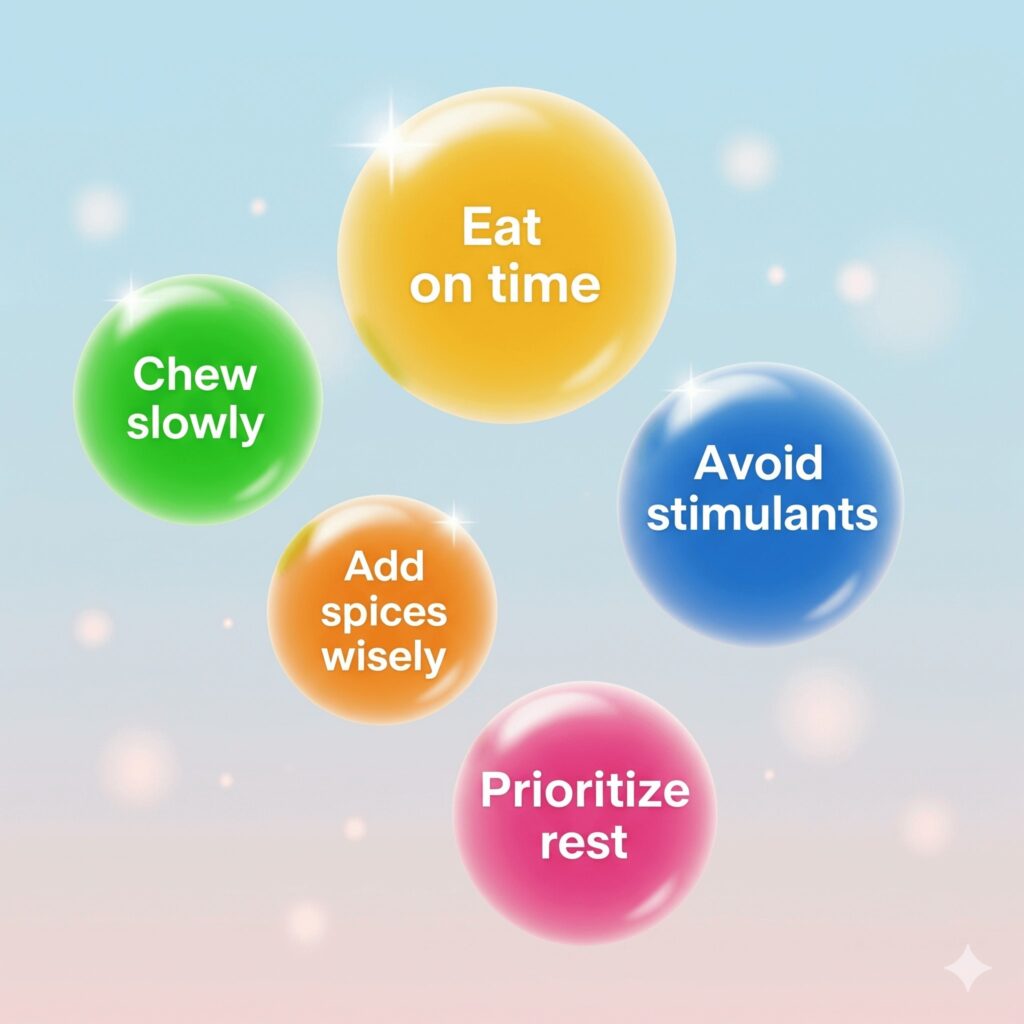Stress relief may seem challenging in today’s fast-paced world, where daily pressures often feel unavoidable. Work deadlines, family responsibilities, traffic jams, and endless digital distractions can easily overwhelm both mind and body. The good news? What you eat can play a powerful role in stress relief.
Experts agree that with mindful, nutrient-rich choices—what we call stress relief nutrition—you can strengthen your body, calm your mind, and build resilience against daily challenges. This approach not only boosts mood and energy but also improves overall well-being. By supporting brain function, regulating stress hormones, and enhancing immunity, Ayurveda for stress relief provides a holistic path to face life’s pressures with balance and inner calm.
How Stress Impacts the Body and Hinders Stress Relief
Stress isn’t just a mental experience—it impacts the entire body. When we’re stressed, our body releases hormones like cortisol and adrenaline. These hormones prepare us to deal with challenges, But when stress becomes constant, the body never gets a chance to rest, pulling us away from stress-free living and affecting both mind and body.
The result?
Disturbed digestion
Poor sleep
Reduced immunity
Mood swings
Fatigue and lack of focus
Over time, this imbalance makes us more vulnerable to lifestyle disorders such as high blood pressure, diabetes, and anxiety-related conditions. This is why it becomes crucial to address stress not just mentally, but holistically—through lifestyle, food, and natural healing practices.
Nutrition: Your First Step Toward Stress Relief

Key Foods for Stress Relief Nutrition:
Food is more than just fuel—it’s information for our body and mind. When we choose the right foods, they support our nervous system, balance hormones, and bring stability to our emotions.
A colorful plate of home-cooked food is most of the times more powerful than the most expensive supplement.
Whole Grains
Foods like brown rice, oats, and millets release energy slowly, keeping blood sugar stable and preventing mood swings.
Fresh Fruits & Vegetables
Packed with antioxidants, vitamins, and minerals, they help reduce the harmful effects of stress on the body.
Nuts & Seeds
Almonds, walnuts, pumpkin seeds, and sunflower seeds are rich in magnesium and omega-3 fatty acids, which improve brain health and calm anxiety.
Herbal Teas
Chamomile, tulsi (holy basil), and ashwagandha teas soothe the nervous system and encourage better sleep.
Hydration
Water and cooling drinks like coconut water prevent stress-related fatigue and dehydration.
Ayurveda for Stress Relief: Balancing Your Doshas
Ayurveda views stress as an imbalance of the body’s natural energies (doshas). Each individual reacts differently, so food and lifestyle choices must be tailored.

Vata: Foods and Habits for Stress Relief
For Vata imbalance (restlessness, anxiety, overthinking): Favor warm, grounding foods like khichdi, ghee, root vegetables, and herbal teas. Avoid raw, cold foods that increase instability.
Pitta: Cooling Foods for Calmness
For Pitta imbalance (anger, irritability, impatience): Cooling foods such as cucumbers, melons, leafy greens, and coconut water help calm the fire element. Minimize spicy or oily foods.
Kapha: Stimulating Foods to Uplift Energy
For Kapha imbalance (lethargy, sadness, lack of motivation): Choose light, stimulating foods like legumes, ginger tea, bitter greens, and spices like black pepper to uplift energy.
Ayurvedic Practices for Stress Relief:
Yoga and meditation for mind-body harmony
Pranayama (breathing practices) to calm the nervous system
Abhyanga (oil massage) to release stored tension and ground the body
Ayurveda’s Gentle Approach to Stress Relief
Instead of quick fixes, Ayurveda focuses on:
Balancing foods → warm, nourishing, easy to digest.
Healing spices → turmeric, cardamom, cinnamon, cumin.
Mindful eating → chewing slowly, eating at regular times.
Daily rhythm (Dinacharya) → sleeping and rising on time.
Ayurveda isn’t just about “what” you eat but also how and when you eat.
Healing Foods and Spices for Stress Relief
Ayurvedic nutrition can calm both mind and body.
Stress-Relieving Foods:
Ayurvedic nutrition can calm both mind and body.
- Warm, freshly cooked meals → support digestion and comfort the mind.
Whole grains like rice, oats, and barley → keep energy steady.
Warm milk with nutmeg or turmeric → promotes relaxation at night.
Natural sweeteners like honey or dates → calm the nervous system (in moderation).
Green vegetables → balance excess heat and irritation.
Stress-Relieving Spices:
Ayurveda loves its spice box, and some are natural stress-busters:
- Turmeric: Anti-inflammatory and uplifting.
Cardamom: Refreshes the mind, aids digestion.
Cinnamon: Stabilizes blood sugar, easing mood swings.
Ashwagandha (herb): A proven adaptogen that reduces anxiety.
Everyday Stress Relief Tips Through Food

1. Eat on time
Irregular eating habits put the body under unnecessary strain. When meals are skipped or delayed, blood sugar levels fluctuate, which can lead to irritability, fatigue, and cravings for unhealthy snacks. Over time, this creates stress not only for the mind but also for the digestive system. Eating at consistent times helps the body settle into a rhythm, making digestion smoother and energy levels more stable throughout the day.
2. Chew slowly
Most of us eat in a hurry, either scrolling on our phones or multitasking. But digestion actually begins in the mouth, and chewing slowly allows the body to absorb nutrients more effectively. This mindful practice also gives your brain time to register fullness, preventing overeating. More importantly, it turns mealtime into a mini relaxation ritual where the mind is fully present and stress naturally takes a backseat.
3. Avoid stimulants
A strong cup of coffee or sugary snack may feel like the perfect pick-me-up during a stressful day, but stimulants like caffeine, alcohol, and refined sugar often backfire. They can spike your energy temporarily but soon cause a crash, leaving you anxious, restless, or drained. Over time, they also disrupt sleep quality, which further fuels stress. Cutting back gradually or replacing them with gentler alternatives like herbal teas or fruit-infused water can make a big difference in your overall calm.
4. Add spices wisely
Spices are not just for taste—they are nature’s medicine cabinet. Turmeric is known for reducing inflammation, cardamom supports digestion and uplifts mood, while cinnamon helps balance blood sugar levels. Including such spices in daily cooking not only enhances flavor but also strengthens the body against the negative effects of stress. Used mindfully, spices bring both healing and joy to your meals.
5. Prioritize rest
Even the most nourishing foods cannot undo the harm of poor sleep. Rest allows the body to repair, balance hormones, and restore mental clarity. Without it, stress levels rise, immunity weakens, and cravings for comfort foods increase. Prioritizing a consistent sleep routine—like winding down with calming teas, switching off screens early, or practicing deep breathing—makes your nutrition efforts far more effective.
Lifestyle Habits That Promote Stress Relief
Along with diet, the way we live each day shapes how much stress affects us:
Regular Exercise – Activities like yoga, walking, or gentle stretching keep the body flexible, release tension, improve circulation, and boost mental clarity. Even 20–30 minutes daily can make a big difference in mood and energy.
Deep Breathing Practices (Pranayama) – Conscious breathing techniques help reduce anxiety, improve oxygen flow, lower heart rate, and calm the nervous system. Practicing 5–10 minutes daily can create a sense of inner peace.
Meditation and Mindfulness – These practices help calm racing thoughts, improve focus, enhance emotional resilience, and cultivate awareness of the present moment. Even a few minutes a day can reset your mind.
Spending Time in Nature – Being outdoors, walking in a park, or tending to plants grounds us, refreshes mental energy, and uplifts mood. Nature reduces stress hormones and promotes a sense of balance and wellbeing.
Consistent Daily Routine – Regular sleep, meal timings, and short breaks throughout the day help maintain energy, prevent burnout, and support a calmer, more resilient mind.
- Social Connections and Joyful Activities – Spending time with loved ones, engaging in hobbies, or laughing can release feel-good hormones, helping the mind stay balanced even during stressful times.
When combined with nourishing food, these lifestyle steps create a complete approach to stress management.
Finally : Cultivating Lasting Stress Relief
While stress is a part of life, we have the power to transform its impact. Nourishing our body with wholesome foods, guided by the timeless wisdom of Ayurveda, strengthens our resilience and vitality. By embracing simple yet powerful habits—like eating mindfully, choosing calming, nutrient-rich foods, and living with intention—we can cultivate a vibrant lifestyle that not only promotes stress relief but also supports overall well-being.
Incorporating daily practices such as yoga, meditation, and pranayama enhances stress relief by calming the nervous system and improving mental clarity. Spending time in nature, maintaining regular sleep patterns, and enjoying social connections further reinforce stress relief naturally, creating a balanced mind and body.
Ultimately, adopting Ayurveda-inspired nutrition and lifestyle choices empowers you to manage stress effectively. These mindful steps provide lasting stress relief, boost immunity, elevate mood, and foster a healthier, more resilient life. With consistent effort, stress relief becomes not just a goal, but a sustainable way of living.
References
Disclaimer:
This blog is for informational purposes only and should not be considered medical advice. Always consult a qualified healthcare professional before making dietary or lifestyle changes. The suggestions shared here are general in nature and may vary based on individual health conditions.
